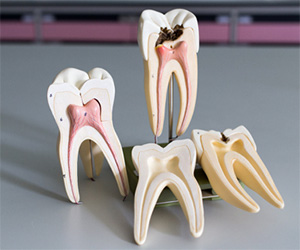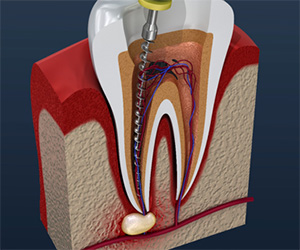







Do you have a severely damaged tooth? It is tempting to have it pulled to solve the problem; however, that should only be used as a last resort. Dr. Megan McInnis can save it with a root canal in Portland. Although over 15 million are performed annually, they are only recommended when there are no other viable treatments to save your tooth. When performed by a qualified and experienced dentist, like Dr. McInnis, root canals have a 95% success rate. While you might be hesitant to undergo the treatment because it has a bad reputation for being painful, you have nothing to fear. Our office uses the latest innovations in dentistry to ensure your comfort.

A root canal is an endodontic procedure used to extract the inner layer of the tooth, called the pulp. This stops the spread of the infection to reinstate its health. A custom-made dental crown is placed over it to give it an added layer of protection with restoring its function and appearance.

Root canal therapy is among the most common restorative treatments that are now no worse than a traditional filling thanks to new advancements in dentistry. There are some signs you may need the procedure to save your tooth from extraction, such as:
Dr. McInnis performs a comprehensive consultation to ensure the procedure is in your best interest. She creates the customized treatment plan you need to stop your pain.

After diagnostic imaging and your consultation, you are scheduled for the first phase of your treatment. The areas of damage and your pulp are removed using special dental tools. Your tooth is sterilized and sealed using a material called gutta-percha. Now, your tooth’s health is restored to allow it to stay in place for several years with the right aftercare.
Dr. McInnis takes a digital impression of your tooth to create your dental crown. It is designed to meet your exact size, shape, and color needs to look like a real tooth to blend in with your smile. The information is sent to the dental lab where it is made from all-ceramic material to meet your exact specifications. This can take a couple of weeks, so Dr. McInnis attaches a temporary crown in the meantime. After your final restoration is ready, you return to our office to have it bonded to your tooth.
It is normal to experience some tenderness for a few days after your procedure; however, it will dissipate quickly. You can use an over-the-counter pain reliever to manage any discomfort.

Patients often have two concerns regarding root canal treatment: pain and price. If you’re in the same boat, then you’ll be happy to hear that the procedure is virtually painless, and our Portland dental team will provide you with an estimate of the price at your appointment so there aren’t any unwanted surprises. Until then, you can read on to learn some helpful information about the cost of root canal treatment!

In short, there are several factors that affect the cost of root canal treatment! A few examples include the number of teeth that need to be treated, the type of tooth being treated, and the complexity of your case. Of course, there are other relevant factors, including if you have dental insurance. Don’t worry – we will review all of this and more with you after we conduct a thorough oral exam and determine the best way to restore your healthy, pain-free smile.

When comparing the cost of root canal treatment to a tooth extraction, it may seem like the latter is cheaper. However, it’s important to consider more than just the upfront cost. After all, after removing a tooth, we need to put a dental bridge or implant in its place (which comes with an additional cost). Plus, we only want to remove your natural teeth when absolutely necessary, like when the infection has progressed to the point where it’s no longer an option to save it.

Dental plans aren’t the same from patient to patient, but they do typically cover essential restorative care. At RiverPlace Dental, we’re proud to welcome Aetna, Delta Dental, MetLife, and several other popular providers so you can utilize your available benefits to keep your out-of-pocket expenses to a minimum. We’ll also explain your coverage in-depth, answer any questions you have about the cost, and file the paperwork on your behalf so you don’t have to stress.

If you don’t have dental insurance, don’t worry! We also offer our patients other ways to save, including:

We know that many of our patients have questions about root canal treatment, especially since you can’t always trust what you’ve heard about it. If you want to learn more about this tooth-saving treatment, then don’t hesitate to reach out to us to schedule an appointment. If you can’t get to the phone right now, don’t worry – you can also read on to learn the answers to FAQs.
To this day, the myth that root canal treatment is painful persists. However, that’s not the case! In fact, the large majority of patients express that the experience is no more cumbersome than having a standard filling done. We have powerful numbing agents, cutting-edge techniques, and the latest technology to thank for that. Plus, if you are nervous because you struggle with dental-related anxiety, you have a fear of needles, or you experience dental sensitivity, we can see if adding sedation dentistry to your treatment plan is an option.
Generally speaking, the answer is yes! That’s why we encourage our patients to adopt healthy habits, like brushing and flossing consistently, visiting us for a checkup and cleaning biannually, and wearing a mouthguard when playing sports. It’s also important that you don’t chew on ice cubes or engage in other unhealthy behaviors that can damage your teeth.
If you were experiencing excruciating pain stemming from one of your teeth, and then the sensation completely subsided, it may mean more bad news. Oftentimes, this is the result of the infection “killing” the nerve of the tooth. Since your gums and surrounding teeth are now vulnerable to damage as well, it’s of the utmost importance that you don’t postpone your treatment. The sooner we can intervene, the sooner we can restore the health and function of your smile.
As we mentioned above, the procedure itself won’t be painful at all. As you recover, it is normal to experience some soreness, however. If your discomfort seems to be getting worse or lingers after three days, then we recommend reaching out to our team.
Note: Before you leave our office, we will provide you with aftercare instructions like taking OTC pain medication, rinsing with warm saltwater, and using a cold compress for 10 minutes at a time. These will help you stay completely comfortable as your mouth heals.
According to the American Dental Association and the American Congress of Obstetricians and Gynecologists, the answer is yes. However, we will still take a few precautions to keep you and your little one safe, like waiting until the second trimester (if possible) and adding antibiotics to your treatment plan to help prevent the infection from spreading.
If you have a damaged or infected tooth, do not have it pulled! Your dentist in Portland can save it with root canal therapy. Contact our office today to schedule your consultation.